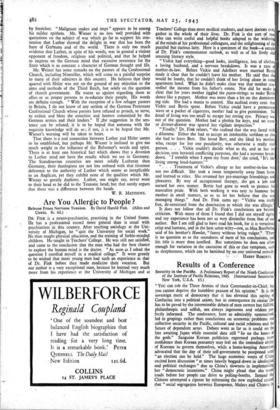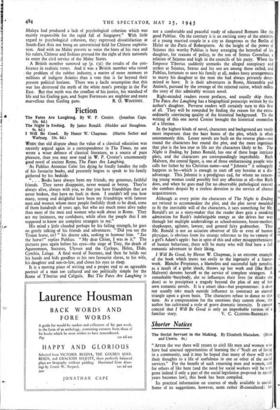Results of a Conference
Security in the Pacific. A Preliminary Report of the Ninth Conference of the Institute of Pacific Relations, 1945. (International Secretariat, New York, U.S.A. $3.)
" You can rob the Three Armies of their Commander-in-Chief, but you cannot deprive the humblest peasant of his opinion." It is the sovereign merit of democracy that it has elevated this saying of Confucius into a political axiom, but in consequence its civitas Del has to be paved by the interminable debate of men earnest but fallible, philanthropic and selfish, not always ingenuous and seldom per- fectly informed. The conference, here so admirably summarised, led to gropings rather than conclusions on economic problems and collective security in the Pacific, cultural and racial relations and the future of dependent areas. Debate went as far as it could on the fate awaiting Japan while essential data still " lie on the knees of the gods." Sanguine Korean publicists expressed perhaps more confidence than Korean peasantry may feel on the immediate ability of Koreans to govern themselves, while a home-keeping American advocated that the day of their self-government be postponed until " an election can be held." The huge economic wants of China excited keen discussion " at times heavily bogged down in ideological and political exchanges " due to China's slowness in implementing her " democratic intentions." China might plead that she needs roads before her people can drive to polling-booths. Instead the Chinese attempted a riposte by reiterating the now exploded canard that " social segregation between Europeans, Malays and Chinese in
Malaya had produced a lack of psychological cohesion which was mainly responsible for the rapid fall of Singapore." With little regard to psychological cohesion, they expressed dissatisfaction at South-East Asia not being an unrestricted field for Chinese exploita- tion. And with no Malay present to voice the fears of his race and his rulers, Chinese and Indians pressed for the right of their nationals to enter the civil service of the Malay States.
A British member summed up (p. 131) the results of the con- ference in realistic terms. And it was a British member who raised the problem of the rubber industry, a matter of more moment to millions of indigent Asiatics than a vote that is far beyond their present political horizon. There was a facile assumption that this war has destroyed the myth of the white man's prestige in the Far East. But that myth was the creation of his justice, his standard of life and his Gatling gun, and Super Fortresses are mightier and more



























 Previous page
Previous page